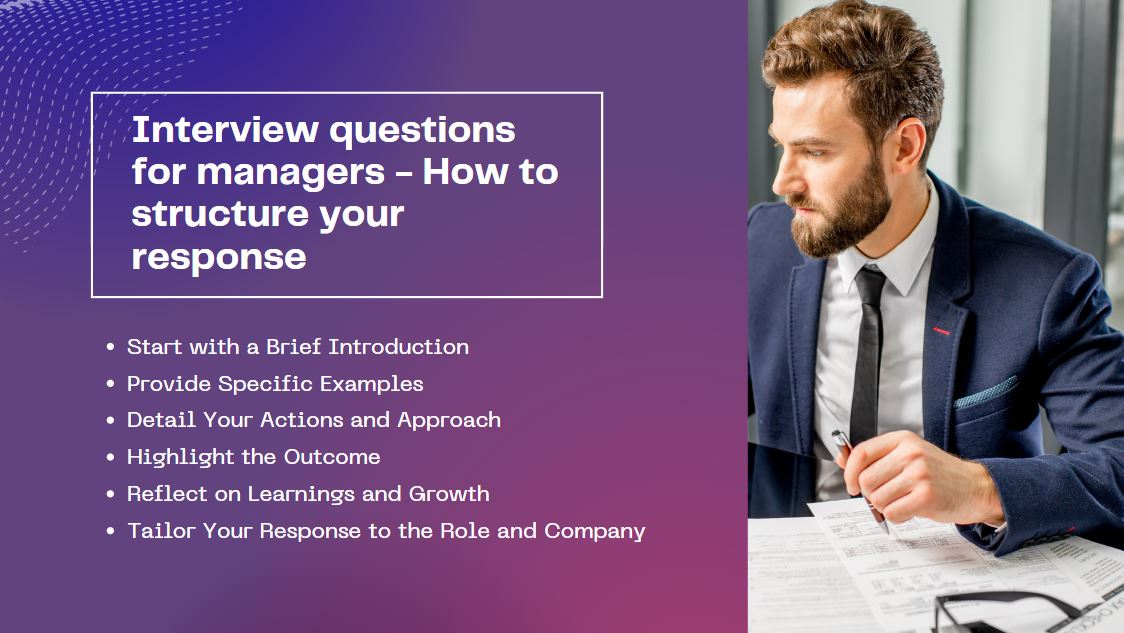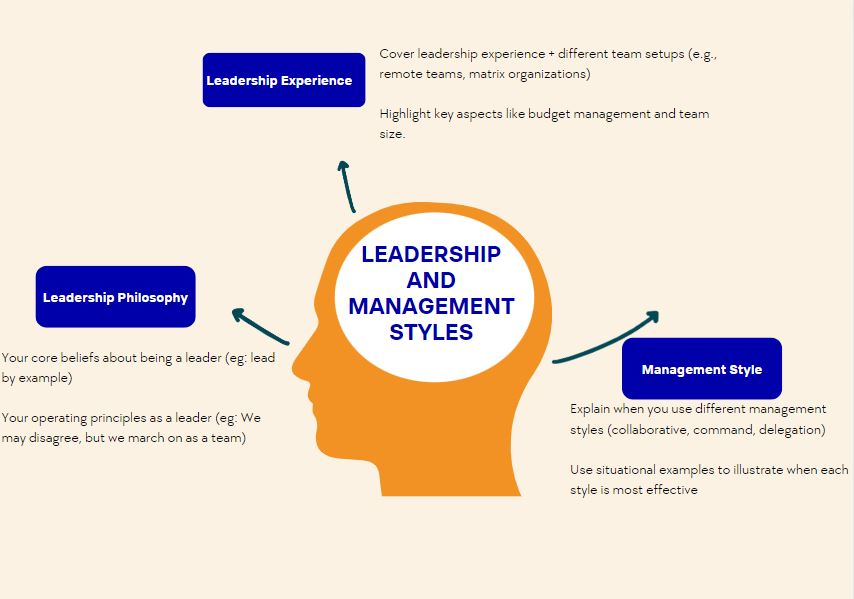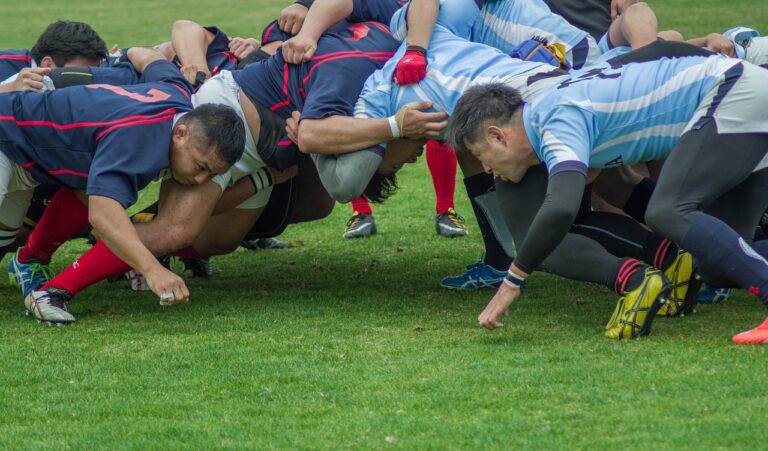How To Ace Your Next Interview: 20+ Interview Questions for Managers With Examples [Nov 2023]

You’ve got your interview for a managerial position – we’ve got you covered.
How to structure your response (regardless of the question)
- Start with a Brief Introduction:
- Begin by briefly introducing the topic or the context of your answer. For example, if the question is about leadership style, start by mentioning your overall approach to leadership.
- Provide Specific Examples:
- Use real-life examples from your past experiences to illustrate your points. This could include situations where you successfully led a team, resolved a conflict, or motivated employees.
- Ensure these examples are relevant to the question and highlight your skills and achievements.
- Detail Your Actions and Approach:
- Clearly explain the steps you took in the given situation. This shows your thought process and decision-making skills.
- Discuss why you chose a particular approach and how it aligns with your management philosophy.
- Highlight the Outcome:
- Conclude your response by sharing the results or impact of your actions. This could be improved team performance, successful project completion, or positive feedback from peers or superiors.
- If possible, quantify your achievements with data or specific metrics.
- Reflect on Learnings and Growth:
- Briefly reflect on what you learned from the experience and how it has shaped your current management style.
- This demonstrates self-awareness and a commitment to continuous improvement.
- Tailor Your Response to the Role and Company:
- Whenever possible, tailor your response to align with the specific role you’re interviewing for and the company’s culture or values.
- This shows that you’ve done your research and are genuinely interested in the position.
Remember, the goal is to provide concise yet comprehensive answers that not only address the question but also demonstrate your qualifications and suitability for the management role.

Let’s get straight into it! Use these examples for inspiration only, good interviewers can smell a copy/paste answer from miles away.
Here are some helpful job interview related blogs
- Tackling the final interview round
- How to answer ‘tell me about yourself’
- What are your career aspirations
- Why do you want this job
- Why should we hire you
- Why are you leaving your job
- What are you passionate about
- Strengths and Weaknesses In Interview
- Interview questions for managers
- What is your management style
- Interview questions for freshers
- Tips to succeed in a job interview
- Types of interview questions
- Interview questions to ask candidates
- Behavioural interview questions
- Walk me through your resume
- What makes you unique
- What are your goals
- How do you handle stress and pressure
- Are you a team player
- How did you hear about this position
- Where do you see yourself in five years
- How do you handle stakeholders
Interview Questions for Managers – Example Answers
1-Tell me about your leadership experience
I have been a leader for the past XYZ years in various roles. During this time, I have managed teams/ remote teams of up to XYZ people. I have managed budgets up to XYZ million dollars. I have been a leader in matrix organizations where I have also led teams that do not report to me directly as their line manager.
I believe strongly in leading by example, setting clear expectations and providing feedback. I also strive to create an environment where everyone is encouraged to contribute their ideas and thoughts.
I build my teams based on the philosophy ‘we may disagree, but we march on as a team’. I personally love it when my team members can disagree in public forums – I use this as a measure of trust, respect and transparency in my teams.
2- How would you describe your management style (or ) Describe your leadership style
I’d describe my management or leadership style as situational. There is never one style of management that is right for every situation.
For example, when I lead a meeting to agree on the strategy/plans for the next year I need everyone on board. In this situation, I’m more likely in the ‘collaborative style’ to ensure I bring everybody with me.
In another case during an urgent issue, the ‘command style’ may be better, especially if I understand the issue better than others.
In other situations, ‘delegation style’ may be effective allowing other leaders the opportunity to shine.
Bottom-line, I pick the style (sub-consciously mostly) that suits the situation and helps long-term development of my team.
3- How do you handle a difficult employee / direct reports?
Every person is different, so there is no single answer to the question.
I first try to understand the root cause of their behavior. I also try to self-reflect if it is only my perception or if it genuinely difficult to handle them. I might also talk to some trusted colleagues to remove any bias and understand the situation from multiple perspectives.
Once I have identified the root cause, I can then develop and implement an action plan to address the issue. This typically involves a combination of coaching, helping them understand the job description, additional training or support, and if necessary, disciplinary action. The goal is always to work with the employee to improve their performance and help them succeed in their role.
4- How do you to motivate employees?
I genuinely believe people want to do better. I take my primary role as giving them the environment & opportunities to shine rather than externally motivating them.
I believe in providing recognition and praise for a job well done. Additionally, I strive to create an atmosphere where everyone is empowered to be creative and innovative. I also like to challenge my employees by setting stretch goals and recognizing milestones along the way.
Finally, I invest time in developing relationships with each of my staff members and provide ongoing feedback to help ensure that everyone is performing at their best.
5- How do you delegate responsibilities to your team?
I delegate for multiple reasons – to free up time for myself, to help team members learn, to create visibility for them and more.
How I delegate responsibilities significantly depends on why I do it.
For example, if my motivation is to highlight their work in front of my peers I coach them and help them present the work to my manager & my peers.
If I delegate to allow them to learn, I say so and set expectations on outcomes. I also agree on what support they need and allocate the time so they ensure a successful outcome.

6- How do you handle conflict between employees?
I strive to create a team environment where having conflicting ideas is normal. Every person is unique and brings a different perspective – I would set up my team philosophy on the premise that diversity (in ideas) make us stronger.
First, I will encourage each party to express their point of view and listen openly to what the other has to say. Next, I will work to identify and address any underlying causes of the conflict, by looking at each person’s needs and interests. My conflict resolution is based on accepting multiple perspectives while showing mutual respect.
I would strive my best to help the individuals rise above their differences. But it that is beyond reach, I would set clear expectations that while disagreement exists, they both commit to moving on in the interest of our common goal
7- Describe a difficult decision you had to make as a manager
One of the most difficult decisions in a management position I had to make was deciding whether or not to lay off a underperforming team member due to budget constraints. Logically, it was an easy decision, but personally it was hard on me to have that conversation.
I realized that it was part of my learning process as a leader, and I have learnt my lessons from it. If I had to do it all again, I would have had more transparent discussions with the concerned team member ahead of time to allow opportunities to improve, but also remind of the consequences if nothing changed.
Sometimes leaders stand alone, and it is ok. That is why they are paid the big bucks!
8- How would you handle a project that was behind schedule
First, I would analyze the underlying cause of the delay and understand why the project is not progressing as expected. Once I have identified the root cause, I can then develop an action plan to get the project back on track. This may involve additional resources, re-allocating tasks or shifting the timeline.
I would also take steps to ensure that all stakeholders are kept up-to-date on progress and any changes that have been made. Finally, I would look for opportunities to learn from this experience and adjust my approach going forward in order to prevent similar issues in the future.
9- How do you manage your workload
It is a very hard thing, and also a very easy thing at the same time. Before I plan my day or week, I spend some time in understanding and analyzing the value I get from each of the tasks I need to perform.
I categorize them into what I must do myself vs what others can do. For example, managing my key stakeholders or coaching my team members is something I would like to do myself and I allocate time for it.
Whatever I can delegate in the interest developing my team members, I do delegate. I’m also honest with them on why I do it.
I make a mental list (or sometimes on my calendar) based on the Eisenhower Matrix and then plan accordingly.
When the opportunity arises, I would rather have a coffee conversation with a stakeholder or a team member rather than typing an email that I can do later.
Long answer short – I prioritize my time based on value and plan accordingly.
10- How do you measure success
Typically I have them as part of the annual performance review criteria. Some of the most important measures of success tend to be
- Contribution to business growth (financial, customer satisfaction, Cost/Income ratio etc.,)
- Health of the team (usually measure via anonymous surveys)
I have a transparent process with my team so they all understand the context when we set goals. The goals for my employees is usually a combination of the business goals + their personal development goals.
In addition, I personally measure my success as a leader by the number of employees I have helped advance in their career.
11- How do you handle failure
I know failures are a necessary step in a eventually successful career path, but I allow myself to feel whatever I feel at the moment.
I’m also open to sharing it my team if it is appropriate.
When the dust settles, I put in some time to retrospect and learn something from the failure. A failure is permanent only if I didn’t learn anything from it.
12- How do you handle a situation where an employee is not meeting expectations
I consider it a failure when someone is surprised to learn about their performance in the annual reviews. I keep it a core principle that performance feedback needs to be continuous and not one-off every 6 months.
Depending on the situation, I might offer additional training or provide feedback and coaching in order to help them improve their skills (eg: technical / problem solving skills).
If necessary, I may also modify their job duties or offer incentives to encourage them to reach their goals. Ultimately, my goal is to help the employee succeed and become an even greater asset to the organization.
For example, if an employee aspires to become a manager, I would coach them on leadership skills needed for the role.
However, if their performance still does not improve, I will take appropriate disciplinary action as needed.
13- What is your approach when it comes to setting goals for a team
My primary goal when setting objectives is to ensure that they are realistic and achievable and helps the team’s professional development. I like to involve my team as much as possible in the process, so that everyone understands their roles and responsibilities. Additionally, I work closely with them to ensure that the objectives are clearly defined and measurable.
Once goals have been established, I strive to provide ongoing support and guidance to help motivate my team and keep them on track. Finally, I make sure to recognize their successes along the way in order to maintain a positive working environment.
14- What is your biggest management strength
My biggest strength in my humble opinion is to bring the team together to achieve a common goal.
I know bring in a certain set of skills and strengths, but I also am aware that I have my weaknesses. My honesty and transparency creates trust between us, and I strive to spread that culture across my teams.
Any team that trusts one another tends to outperform.
A good leader must have built a team that outlasts the leader. I have been fortunate enough to have built teams that have worked well even after I left – there’s nothing I’m more proud of!
15- How do you make important decisions?
It depends on what kind of decision making is needed.
If it affects one particular individual, I talk to the person and try to align and manage expectations.
If it affects the entire team, I try a collaborative decision making process where all the team members feel heard and believe it is a collective decision. When everyone gets a vote, they join the party even if they were originally not in favor of the decision.
There are some decisions that are purely just mine, and I make those with complete honesty (to myself). For example, if an underperformer needs to be let go then I make it mine and stay accountable for it.
Additionally, I provide regular updates to my team so they know what needs to be done and when it needs to be completed.
Finally, I make sure to keep all relevant documents and materials organized in a central location, so that they are easily accessible when needed. By taking these steps, I am able to manage multiple projects efficiently and effectively.
16- What do you think is the most important quality of an effective manager?
In my opinion, the most important quality of an effective manager is the ability to lead. This includes having a clear vision for the team and being able to communicate this effectively, setting high expectations while motivating and inspiring others, providing guidance and direction when needed, developing strong relationships with both employees and stakeholders, and taking initiative on projects in order to ensure their success.
Additionally, effective managers must be organized and able to manage multiple tasks and projects simultaneously. By possessing these qualities, a manager can ensure that their team is productive and efficient while achieving the desired results.
17- How do you ensure that your team is on track to meet deadlines?
In order to ensure my team is on track to meet deadlines, I set realistic goals and break down tasks into manageable chunks. Additionally, I prioritize tasks based on their importance and delegate responsibilities accordingly. Furthermore, I use task management software to track each project’s timeline and milestones, as well as any potential issues that may arise.
Moreover, I provide regular updates to my team and stakeholders so they are aware of the project’s progress.
Finally, I encourage collaboration between team members in order to identify solutions and find ways to optimize their workflow.
18- What’s One Essential Skill You Learned In Your Most Recent Job?
One of the most essential skills I learned in my most recent job was learning how to use technology to automate a lot of mundane work or reporting and communication.
With the support of my senior management, I was able to implement an advanced project management solution that automated most of the reporting and released capacity from the skilled people to focus on more high-value tasks.
The summary of the story – I learnt that if my management cannot see the benefits I can see, it is far more productive to improve my persuasion and communication than complain about the senior executives.
19- Could you tell me about a time when you improved your ideas based on your teammate’s suggestion?
Yes, in my most recent job I had to collaborate with other team members on a project. At one point during the process, I suggested a certain approach which was met with some skepticism from my teammates. However, after further discussion, we all agreed that another approach would be more suitable for the task at hand. With everyone’s input, we managed to come up with a solution that was more efficient and effective than the original one.
By listening to my teammates’ ideas and incorporating them into our plan, I was able to improve upon my own suggestion and ultimately achieve success. Overall this experience taught me the importance of collaboration in a team setting.
On another occasion we added the working members of the team into the hiring team to ensure new employees fit the organization more culturally.
20- How do you ensure that your team is aligned with the company’s mission and values?
Answer: In order to ensure that my team is aligned with the company’s mission and values, I focus on communication and transparency. I ensure that everyone has a clear understanding of the goals and objectives of the project by providing regular updates and using open dialogue. Additionally, I encourage team members to suggest ideas for improvement, discuss their thoughts openly and work together to create solutions.
As hiring managers, we also need to focus on bringing the right people into the company who fit into the company culture, company’s core values and work environment.
Furthermore, I emphasize the importance of following the company’s policies and procedures to ensure that everyone is on the same page. By taking these steps, I am able to maintain alignment with our mission and values as a team.
In addition, I also take the time to recognize individual achievements as well as team
21- How do you build and maintain relationships with clients, partners, and other stakeholders?
In order to build and maintain relationships with clients, partners, and other stakeholders, I focus on effective communication. I meet my my stakeholders where they are and provide the level of detail that makes sense to them.
For example, I briefly provide a high level status to my CIO (I get 10 minutes every two weeks), and use the time primarily to seek support that I cannot manage myself.
If I speak to my immediate manager, then I’m a lot more detailed as I can get some feedback and course correct before it is too late.
In short, I keep my audience in mind and tailor my communication style that best fits their style and agenda.
How are management interview questions different from standard interview questions?
Management interview questions are different from standard interview questions in that they focus more on the applicant’s leadership and management abilities. Questions may ask about how the candidate has handled difficult situations, how they foster collaboration among team members and how they build relationships with clients and other stakeholders.
Management interviews also assess the candidate’s experience in leading a team, delegating tasks and motivating others to reach goals. It is important for candidates to be able to effectively explain their leadership style and demonstrate how they are organized and capable of managing a team.
Overall, management interview questions are designed to measure the applicant’s ability to lead, manage projects and ensure that teams reach their objectives in an efficient manner.
With these questions, employers can assess the candidate’s skills in order to determine if they are the right fit for their team and organization.
Other manager interview questions you might want to prepare for
- Can you describe a time when you had to make a difficult budget or resource allocation decision and how you handled it?
- Can you provide an example of using feedback from team members to improve your own performance as a leader?
- What Does Being A Manager Mean To You?
- What are your salary and compensation expectations?
- What would you have changed at your last job?
- What Is Your Biggest Management Strength?
- What Was Your Favorite Experience As A Manager?
- How do you build diverse teams?
- How do reward loyal employees?
- Who was your best management hire and why?
- What’s the hardest part of this interview process?
- What is your dream job?
- Who was your best manager and why?
- What’s your favorite interview question?
- How do you define success as a manager?
- How would you prepare for an important meeting?
- How do you like to be coached, and what kind of feedback do you think is most helpful?
- Have you ever had to motivate a team after something demotivating happened?
These are just a few of the questions that you may need to answer in a manager interview. As you can see, employers will want to know about your leadership style and how you handle difficult situations. It is important to demonstrate your ability to think strategically, motivate your team and make tough decisions when necessary.
Good luck!
Here’s some helpful career/leadership related blogs
- Careers– Agile Coach, RTE, Product Owner, Scrum Master, QA Manager
- Career development plan
- Career growth
- Project Management
- Managing Managers
- IT Career switch
- Software Engineering career path
- Agility, Agile Testing
- Remote leadership / Leadership traits / Agile leadership
Other Productivity / Tools posts that may interest you
- Productivity
- Book summary apps – Headway App vs Blinkist vs getAbstract
- AI Writers: / Blogging – Jasper, Writesonic, Article Forge , Copy AI, Anyword, Writecream, Copymatic, Quillbot, Peppertype, Jasper AI (pricing) &
- Work From Home tools: Jabra
Author also writes at his Medium site.





